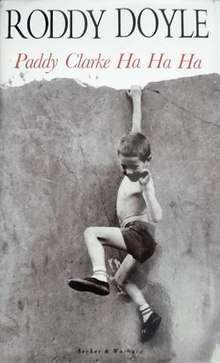Paddy Clarke Ha Ha Ha
Paddy Clarke Ha Ha Ha is a novel by Irish writer Roddy Doyle, first published in 1993 by Secker and Warburg. It won the Booker Prize that year. The story is about a 10-year-old boy living in Barrytown, North Dublin, and the events that happen within his age group, school and home in around 1968.
 Cover of hardcover edition | |
| Author | Roddy Doyle |
|---|---|
| Country | Ireland |
| Language | English |
| Genre | Novel |
| Publisher | Secker & Warburg (UK) Viking Press (US) |
Publication date | 1993 |
| Media type | |
| ISBN | 0-436-20135-6 |
| OCLC | 29258939 |
| LC Class | PR6054.O95 P33 1993 |
Language and plot structure
The novel is known for its interesting use of language – Doyle uses a register that gives the reader the vivid impression of listening to a ten-year-old Irish boy from the 1960s. The novel is not divided into chapters but into small scenes which do not follow any chronological order.
The plot structure of the novel is also unconventional, that of numerous vignettes. Despite the absence of a clear-cut plot (introduction, complication, climax, dénouement) one can still, with certain sensitivities in place, derive a perceptible passing of time as we witness, gradually, how Barrytown changes.
The novel, chronicling Paddy's internal journey towards maturity, is a bildungsroman as it centres upon the main character's development. Paddy's growing up is painfully bitter. While the beginning of the book is filled with playful antics, the growing antagonism between his parents and the breaking up of their marriage are evident as the novel moves on. What makes Paddy's rite of passage, as it were, all the more tragic is the fact that he does not choose his "journey of enlightenment and maturity", rather, he is robbed of it when his parents become estranged from one another.
Plot synopsis
Paddy Clarke Ha Ha Ha recounts (approximately) one year in the life of a Dublin ten-year-old, Patrick "Paddy" Clarke, especially his relationships with Sinbad (Francis), his younger brother, his parents and his schoolmates and teachers. It begins with him being a mischievous boy roaming around local Barrytown and ends with his father departing from the family, forcing the boy to take up adult responsibilities in his now single-parent home.[1]
Critical reaction
The Independent praised it as "one of the truest and funniest presentations of juvenile experience in any recent literature".[2]
When it won the Booker Prize, the book was mocked by some people as an "easy", "populist" choice.[3]
References
- Paddy Clarke Ha Ha Ha: Plot, BBC GCSE Bitesize
- BOOK REVIEW / A boy's own adventure: 'Paddy Clarke Ha Ha Ha' - Roddy Doyle: Secker, 14.95 pounds, The Independent, 12 June 1993
- Guardian book club: Paddy Clarke Ha Ha Ha by Roddy Doyle, The Guardian, 14 Aug 2009